The Dalai Lama left Washington, DC, on Saturday (October 10) after a packed agenda in the US capital that included meetings with Congressional leaders; acceptance of a human rights award from the Tom Lantos Foundation for his work for peace; the presentation of an ICT award to the late Julia Taft, former Special Coordinator for Tibetan Issues as well as a group of courageous Chinese signatories to a petition urging better policies on Tibet; and participation in a conference on spirituality, education and science. During his visit, the Dalai Lama made a quiet visit to Arlington cemetery with 50 members of the Kennedy family to pay tribute to the late Sen. Ted Kennedy, and he met the new Special Coordinator for Tibetan Issues, Under Secretary of State Maria Otero.
It was the Dalai Lama’s first visit to Washington since he was awarded the Congressional Gold Medal by President Bush and the Congressional leadership in October 2007. In addition to his meetings with Members of the U.S. Congress, during his six-day visit the Dalai Lama also met with diplomats stationed in Washington, and Chinese intellectuals and other community members as part of the broader strategy of reaching out to and building bridges with the Chinese community.
“The Dalai Lama found a receptive audience on Capitol Hill, both with old friends and new Members, for his message and efforts to find a durable solution for six million Tibetans yearning for freedom,” said Todd Stein, Director of Government Relations at the International Campaign for Tibet. “Members of Congress affirmed their support, through both policy and programs, to preserve the Tibetan identity and to promote a negotiated resolution of the Tibet issue.”
Pelosi: The cause of Tibet as a “challenge to the conscience of the world”
On Tuesday, October 6, the Dalai Lama was received in the morning by the Speaker of the US House of Representatives, Nancy Pelosi, and senior House Members. He joined Pelosi, Senator John McCain, the 2008 Republican presidential nominee, and Congressman Howard Berman, Chairman on the House Foreign Affairs Committee, at the ceremony at which he received the inaugural Tom Lantos Human Rights Award in front of an audience of around 1000 people gathered in the Congressional Visitors Center. Katrina Lantos Swett, the daughter of the late Congressman Tom Lantos, said in her comments that although her father and the Dalai Lama had come from exceptionally different backgrounds, what brought them together was their “deeply shared commitment to universal human rights.”
In her remarks to the audience, Speaker Pelosi said: “For more than 20 years, His Holiness has advocated for Tibetan autonomy within the framework of the People’s Republic of China. His Holiness has expressed a desire to visit China and to engage directly with Chinese officials. It is our hope that the Chinese government will welcome this opportunity for a peaceful resolution of the issue of Tibet. The cause of Tibet is a challenge to the conscience of the world. We must not fail to meet that challenge. In fact, unless we speak out on human rights in China and Tibet, we lose all moral authority to talk about human rights anywhere in the world.”
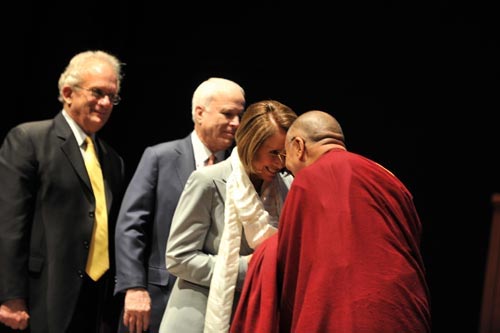
Speaker Pelosi (D-CA) greets the Dalai Lama during the inaugural Tom Lantos Human Rights Prize award ceremony. Also pictured: Senator John McCain (R-AZ) and Congressman Howard Berman (D-CA). (ICT / Sonam Zoksang)
The Dalai Lama praised Tom Lantos’ spirit of service, saying: “Personally, there are many similarities. He is also a refugee. He experienced lot of difficulties in his life, but through his own hard work, and spirit and will, he became successful. Not only successful as an individual, but also in tremendous service to people.”
Tom Lantos’ grandson, Dr Tomicah Tillemann concluded the awards ceremony when he said: “These two men [the Dalai Lama and Tom Lantos] were forged in fires hotter than any we are likely to encounter. But as we work to advance the cause of human rights, each of us has an opportunity to grasp something of their greatness. In this long battle ñ as in any long battle ñ good leaders like the Dalai Lama and Tom Lantos are necessary. But they are not enough. And our praise for them cannot serve as a proxy for our commitment to this cause ñ a commitment to carry on until every man, woman and child on this planet is free to realize their potential.”
The entire ceremony was broadcast on C-Span, and can be viewed here »
Dalai Lama briefs US House groups on China, human rights
The Dalai Lama met with two bipartisan groups in the U.S. House of Representatives, the US-China Working Group, which promotes engagement with China, and the Tom Lantos Human Rights Commission, whose precursor organization gave the Dalai Lama his first governmental forum in 1987. From here, he went on to meet eminent Chinese scientific scholars based in Washington, DC as part of the overall commitment to strengthening ties with the Chinese community both in China and around the world.
The final engagement of the day was at Arlington Ceremony, where the Dalai Lama paid his respects and prayed at the grave of the recently deceased Edward Kennedy and other members of the Kennedy family interred there, including President John F Kennedy and Robert J Kennedy. Around 50 members of the extended Kennedy family were present at the ceremony. In a moving tribute, the Dalai Lama recalled former President John F Kennedy’s words, “Ask not what your country can do for you. Ask what you can do for your country.” He said that while death is inevitable, what is important is what people do from the time they are born until the day they die.
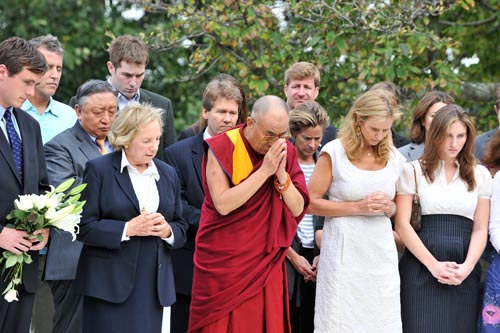
The Dalai Lama paid his respects and prayed at the grave of the recently deceased Edward Kennedy at Arlington National Cemetery. (ICT / Sonam Zoksang)
Light of Truth award presented to Chinese intellectuals
His Holiness the Dalai Lama presented the International Campaign for Tibet’s (ICT) Light of Truth award to two recipients: the late Julia Taft, Special Coordinator for Tibetan Issues from 1999 to 2001 and ICT board member from 2004 to 2008; and to Wang Lixiong, the Chinese writer who co-authored and disseminated a petition calling on the Chinese authorities to exercise restraint and caution in their response to the wave of protests that swept Tibet in March 2008. Wang received the award on behalf of all of the signatories to the petition “Twelve Suggestion for Handling the Tibetan Situation.” Julia Taft passed away in 2008, and her award was received by her husband, The Honorable William H. Taft IV.
Mary Beth Markey, ICT’s Vice President for International Advocacy, opened the awards ceremony at the Sidney Harmon Hall by saying that this is an “extraordinary time” for Tibet, and that events over the past 18 months have “raised the stakes for each of us who hold the conviction that Tibet matters,” and that these events “must raise the stakes for our political leaders in how Tibet is counted within the U.S.-Chinese relationship.” Then Richard Gere, Chairman of the Board of the International Campaign for Tibet which decided on the LOT recipients, welcomed the audience.
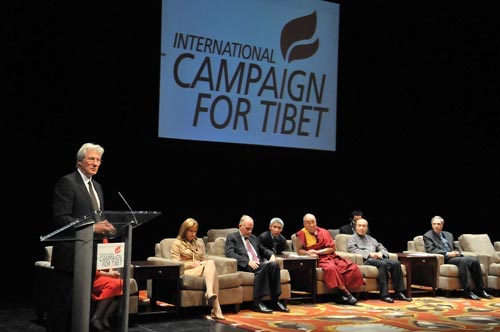
Richard Gere, Chairman of the Board of the International Campaign for Tibet, welcomed the audience during the 2009 Light of Truth Awards. (ICT / Sonam Zoksang)
His Holiness the Dalai Lama was presented on stage by Speaker, Nancy Pelosi. In his acceptance speech, Wang Lixiong expressed concern for a co-author of the petition Liu Xiaobo, who was detained by police in December 2008 after writing a manifesto for democratic reforms in China. “Charter 08” was also widely circulated in China as a petition, and several of its signatories were present in the auditorium for the Light of Truth award ceremony. Liu was formally charged in June 2009 with the crime of “incitement to subvert state power,” and faces a maximum term of life imprisonment if convicted.
Wang Lixiong was careful to stress in his speech that he was not “taking sides” by offering criticism of the Chinese government, and that his stance should not be regarded as “anti-China” ñ sentiments later echoed by the Dalai Lama. Instead, Wang insisted it was the pursuit of truth that put him and other signatories of the petition on Tibet in opposition with the Chinese government. “Daring to criticize the government is done for the good of China, but a government that cannot accept criticism can only bring harm to China,” he said to applause.
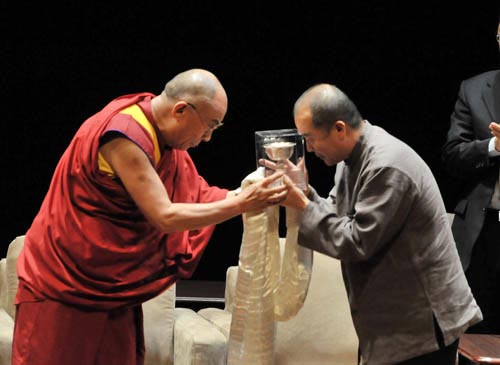
The Dalai Lama presents a Light of Truth Award to Wang Lixiong, the Chinese writer who co-authored and disseminated a petition calling on the Chinese authorities to exercise restraint and caution in their response to the wave of protests that swept Tibet in March 2008. (ICT / Sonam Zoksang)
Wang Lixiong was introduced by former US ambassador to China, Winston Lord, who praised the “valor and significance” of the petition “Twelve Suggestion for Handling the Tibetan Situation.” He also spoke of his hope that the official verdict of the June 4, 1989 Tiananmen Massacre would in future be overturned “so that ‘hooligans’ will become heroes and ëblack hands’ will become harbingers of history,” adding that Wang Lixiong and the other signatories of the petition are also “true heroes and harbingers of history.”
Ambassador Paula Dobriansky, former Special Coordinator for Tibetan Issues, introduced the late Julia Taft, describing the energy, drive and humor she brought to all of her posts throughout a long and distinguished career. She added that the issue of Tibet and the plight of Tibetan refugees had always been one of the closest to her heart, not least because of her personal friendship with the Dalai Lama.
The Dalai Lama said, “Indeed I am very, very happy to give this award to someone who I think is a very distinguished person, Julia Taft. And although she is no longer with us, the memory of her dedication and her warm-heartedness remains in many people’s minds.”
In the Dalai Lama’s comments closing the award ceremony, he talked about his admiration for Julia Taft and Wang Lixiong, adding that the label of being “pro-Tibet” does not and should not make someone automatically “anti-China,” and rather that people who are “pro-Tibet” are in fact “pro-justice”. (Transcripts of the speeches can be read here: His Holiness the Dalai Lama presents Light of Truth Awards in Washington, DC)
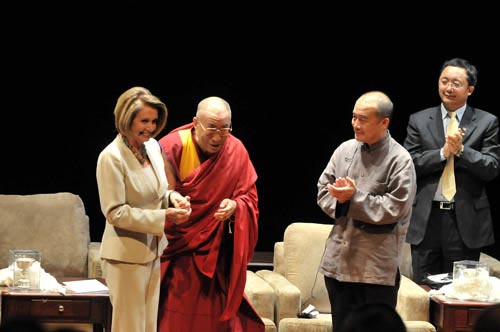
The Dalai Lama with Speaker Pelosi and Wang Lixiong during the 2009 Light of Truth Awards ceremony. (ICT / Sonam Zoksang)
The International Campaign for Tibet’s Light of Truth award was first presented in 1996, and is bestowed upon individuals and organizations that have made outstanding contributions to the public understanding of Tibet and the plight of the Tibetan people. Previous recipients include Archbishop Desmond Tutu, Vaclev Havel, and Martin Scorsese.
Dalai Lama meets with U.S. senators
After paying a short visit to the Laogai Museum, founded by the Chinese democracy activist Harry Wu to document the history and the extent of the network of labor camps throughout China and Tibet, the Dalai Lama then went back to the US Congress to talk with a group of new senators (elected in the last three years) and to meet with members of Senate Foreign Relations Committee, chaired by Senator John Kerry.
Dalai Lama joins experts in education, neuroscience, for Mind and Life conference
On Thursday and Friday (October 8 and 9), the Dalai Lama joined experts in education, neuroscience, psychology, and philosophy to participate in a two-day conference “Educating World Citizens for the 21st Century,” organized by the Mind and Life Institute.
The aim of the conference was to promote more academic research into the value of integrating emotional, intellectual, and social learning into today’s educational programs. It was the 19th annual dialogue between scientific researchers into human consciousness and the Dalai Lama, who has written on secular ethics for the new millennium, and methods of transforming the mind that enhance personal responsibility, love, compassion, and kindness.
Laura Baun, Operations Director of the Mind and Life Institute, said: “Our goal was not to promote any particular educational approach, but to generate dialogue and new ideas from experts in these fields. Ultimately, we want to know what the value of mindfulness practice is to students, teachers and parents who are using these methods. Our dialogue with the Dalai Lama looked at what students need, and what research could be most relevant to young people.”
On Saturday (October 10), the Dalai Lama gave a teaching to a packed hall at American University, hosted by the Conservancy for Tibetan Art and Culture (www.tibetanculture.org). The program brought together thousands of Buddhists from 24 different cultures, and began with the recitation of the Buddhist Heart Sutra in Pali, Chinese, Vietnamese and Tibetan. The Dalai Lama explained that different religions were not only needed in order to suit the mental disposition of different individuals but that they also had the same objectives both at the theoretical and practical levels. He said in the theistic religious traditions, there is a special bond between the individual and God the creator. This called for total submission of the individual to the will of God, and results in the reduction of a self-centered ego, which is something that religions like Buddhism also aspire for. At the practical level, he said all religious traditions called for the practice of compassion in different ways. His Holiness emphasized the importance of individuals keeping their own religious beliefs while respecting all religious traditions.
He left for the airport after an audience with the Tibetan community in Washington at the Adas Israel Congregation synagogue.

